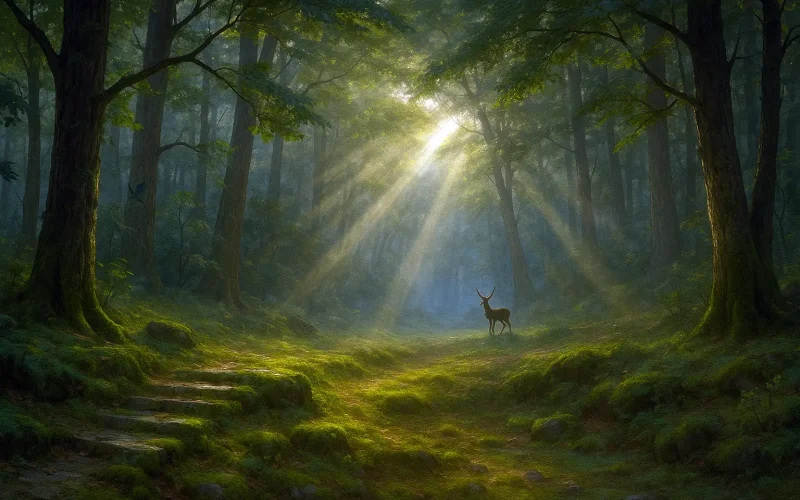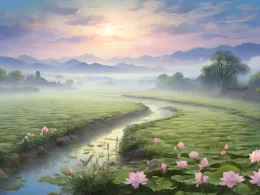There seems to be no one on the empty mountain...
And yet I think I hear a voice,
Where sunlight, entering a grove,
Shines back to me from the green moss.
Original Poem
「鹿柴」
王维
空山不见人,但闻人语响。
返景入深林,复照青苔上。
Interpretation
This poem was composed during Wang Wei's reclusive years in his Wangchuan Villa near Lantian, Shaanxi, representing one of his later landscape masterpieces. "Deer Enclosure" (鹿柴) was among the twenty scenic spots of Wangchuan Valley—a secluded, lush grove frequented by the poet. Living in harmony with nature while amusing himself with poetry and painting, Wang Wei developed his signature style where "poetry holds painting's essence, and painting embodies poetic spirit." Written in this context, "Deer Enclosure" contains no explicit emotion yet radiates the poet's devotion to serene living and detachment from worldly clamor.
First Couplet: "空山不见人,但闻人语响。"
Kōng shān bú jiàn rén, dàn wén rén yǔ xiǎng.
Empty mountains: no man in sight,/ Yet voices echo as if nearby.
This couplet constructs a painterly composition where "empty mountains" (空山) establish a meditative void—not denoting desolation but sacred solitude. The interplay between visual absence ("no man") and aural presence ("voices echo") creates paradoxical stillness: human sounds, instead of breaking silence, deepen it by emphasizing the enveloping quietude. This "sonorous silence" transports readers into the woods where stray vocal reverberations become the only markers of existence, mirroring the poet's translucent state of mind.
Second Couplet: "返景入深林,复照青苔上。"
Fǎn jǐng rù shēn lín, fù zhào qīng tái shàng.
Sunbeams pierce deep woods anew,/ Gilding moss in transient glow.
"Returning light" (返景)—the day's last tender illumination—is captured with Zen-like precision. The beams' gentle caress on shade-dwelling moss (青苔) becomes a masterstroke: this rare luminosity accentuates the forest's perpetual gloom while embodying life's ephemeral beauty. Wang Wei's observation of how fleeting light interacts with humblest flora reveals both his painterly sensitivity to chiaroscuro and philosophical contemplation of impermanence.
Holistic Appreciation
In merely twenty characters across four lines, Wang Wei conveys profound emotion through pure imagery. By crafting movement within stillness (echoes in silence) and light within darkness (sunbeams in deep woods), he builds a crystal-clear poetic universe. The poem's sparse elements—unpeopled mountains, stray voices, mossy light—converge into a natural order radiating serene beauty, reflecting the poet's hard-won spiritual withdrawal from worldly chaos.
This tranquility transcends physical quietude to become metaphysical clarity—a Buddhist-tinged pursuit of unperturbed consciousness. Readers witnessing this "sunset-on-moss" moment virtually stand beside Wang Wei in the grove, absorbing silence and filtered light to access inner peace and enlightenment.
Artistic Merits
The poem exemplifies the technique of "depicting stillness through movement, revealing silence through sound"—Wang Wei masterfully employs subtle contrasts (e.g., "empty mountains" vs. "human echoes", "deep woods" vs. "returning sunlight") to intensify the atmosphere, making tranquility resonate more profoundly. With supremely economical language, he pares down to essentials, constructing vast, serene landscapes in minimal characters. The interplay of shifting light and auditory impressions enhances both pictorial quality and spatial depth, showcasing the poet's refined aesthetic sensibility and unique perception.
Imbued with distinct Zen spirit, the poem reflects Wang Wei's deep Buddhist influences—his consistent pursuit of mental purity harmonized with nature. Rather than explicit emotion, the verses embrace "meaning beyond words" through purposeful silence, embodying the ink-wash painting principle where "not a single stroke is wasted, yet all vitality is captured". This artistic approach achieves the Chan ideal of "expressing infinity within finitude".
Insights
The poem illuminates how genuine serenity stems not from physical isolation but mental clarity. In our hyperconnected era, Wang Wei's model of communing with nature to cultivate inner stillness remains vital. It teaches that sublime beauty often resides in simplicity—a sunbeam, a patch of moss—and that poetic living means honoring such fleeting wonders. The "empty mountains" and "returning light" ultimately symbolize spiritual epiphanies available to those who, like Wang Wei, practice contemplative presence amid life's turbulence.
Poem translator
Kiang Kanghu
About the poet

Wang Wei (王维), 701 - 761 A.D., was a native of Yuncheng, Shanxi Province. Wang Wei was a poet of landscape and idylls. His poems of landscape and idylls, with far-reaching images and mysterious meanings, were widely loved by readers in later generations, but Wang Wei never really became a man of landscape and idylls.












